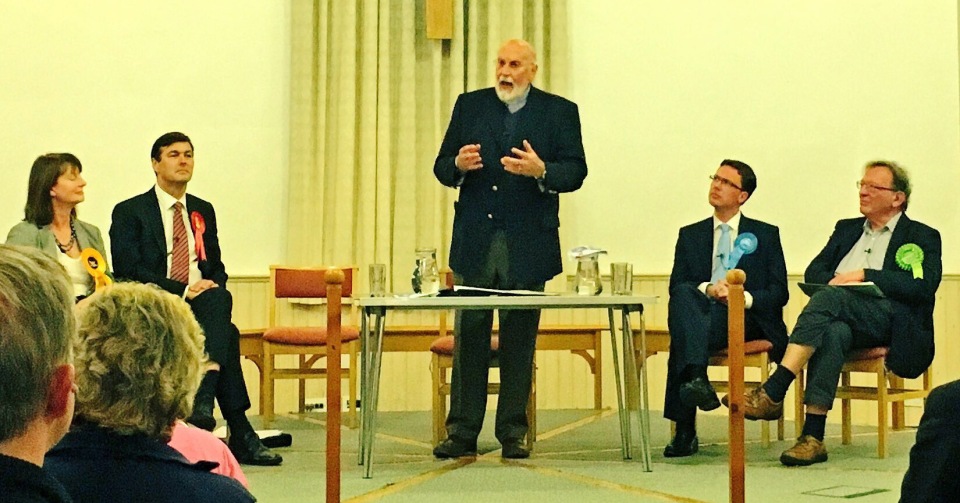Hustings are hard to read. Even before the candidates open their mouths factors have already influenced the opinions about to be formed; every attendee arrives preprogrammed with a lifetime of preferences and biases, and in this case, just like the tv version, decisions about which candidates will participate have been made by the organisers.

Witney Hustings, Methodist Church, Monday 10 October
Then when the candidates do speak, their words are variously bolstered, dismissed and occasionally rejected by an audience with several partisan elements. Attempting to separate out the activists and party faithful to form an objective opinion about which candidate has been the most influential with the punter is itself subjective. But sometimes a moment stands out.
The fourth of six preselected (and well constructed) questions was about the NHS and led to hissing and booing from the audience when the Conservative candidate began his answer with a reference to Jeremy Hunt’s now infamous weekend death rate statistic. So infamous that Tim Harford, presenter of More or Less, took it apart in an article for the Financial Times titled ‘How politicians poisoned statistics‘.
While it’s heartening to know that people in Witney are so well informed, it’s quite disturbing to discover that the favourite to represent them isn’t. And surprising; I’d say a lawyer is highly unlikely to mix up correlation with causation. So how did it come about?
My guess is it’s down to a lack of critical thinking that occurs in groups with a shared cause; a mixture of groupthink and confirmation bias creating an environment in which people tend not to question or challenge what appear to be accepted norms. Put simply, Robert Courts has read his party’s position on a subject he’s not that familiar with and trusted it, taking it at face value. This phenomenon won’t be confined to the Conservative Party, but now I come to think of it, I know nothing about how its policy is arrived at – does it debate it at conference? Whatever the process is, is it more or less likely than other parties to lead to poor decisions?
Oft mentioned in Robert’s argument for his candidacy (I’ve lost count of the number of leaflets posted through our door) is the fact he’ll be a Conservative MP working in a Conservative government with local Conservative controlled councils, implying that he’ll have more influence as in insider. We could really do with an influential MP working to resolve the growing problems of local transport, health services and affordable housing here, but one can’t help noticing that we’ve had exactly that with the added advantage of a Conservative PM for the past six years. Just how much more influence can a constituency have?
Paradoxically, local Conservative councillors appear to have little or no influence with their party colleagues in national government, as was highlighted by letter-gate last year when the the local and national leaders clashed over cuts to the local budget. Where is it going wrong?
David Cameron held this seat for the Conservatives in 2015 with a decisive 60% of the vote so it’s both Robert Courts and the Conservative party’s to lose, and an extremely tall order for any other candidate and party to win. In which case, extending my guess to a working hypothesis that states ‘Conservative party dominance is constricting creativity and causing complacency’, where will the diversity in thinking and new ideas come from if we get more of the same?
I suggest we need more diversity in our politics, for all our sakes.
From the title I thought this was going to be about the SNP:
nationally favouring ‘active travel’
local councillors voting against safe cycle lanes
“Bears Way”- A81 Milngvie Road, Bearsden, Glasgow
Holmston road, Ayr
Ha! And I wasn’t expecting that as a reply but it’s an interesting parallel. Certainly demonstrates that disconnects between national and local policies aren’t limited to the Conservative party.
Do any parties have a mechanism for aligning national initiatives with local issues? Do local councillors, who are essentially volunteers, have that much time to ensure their local actions support their party’s national agenda?
My perception of the past 6 years is that national government has passed the parcel with responsibilities (localism), while simultaneously removing the funds to allow local government to carry those responsibilities out. That *is* entirely down to the Conservative Party, and as letter-gate demonstrated the risks and implications to local services don’t seem to have been discussed between national and local government until after the fact. Is there a forum for those discussions? Is it part of the ‘party’ agenda? Presumably it’s already part of the ‘government’ agenda, so where does that happen?
When you try to follow through this notion of an influential link between national and local politics, you can’t help wondering why it doesn’t exist, or if it does exist, why it doesn’t seem to work.